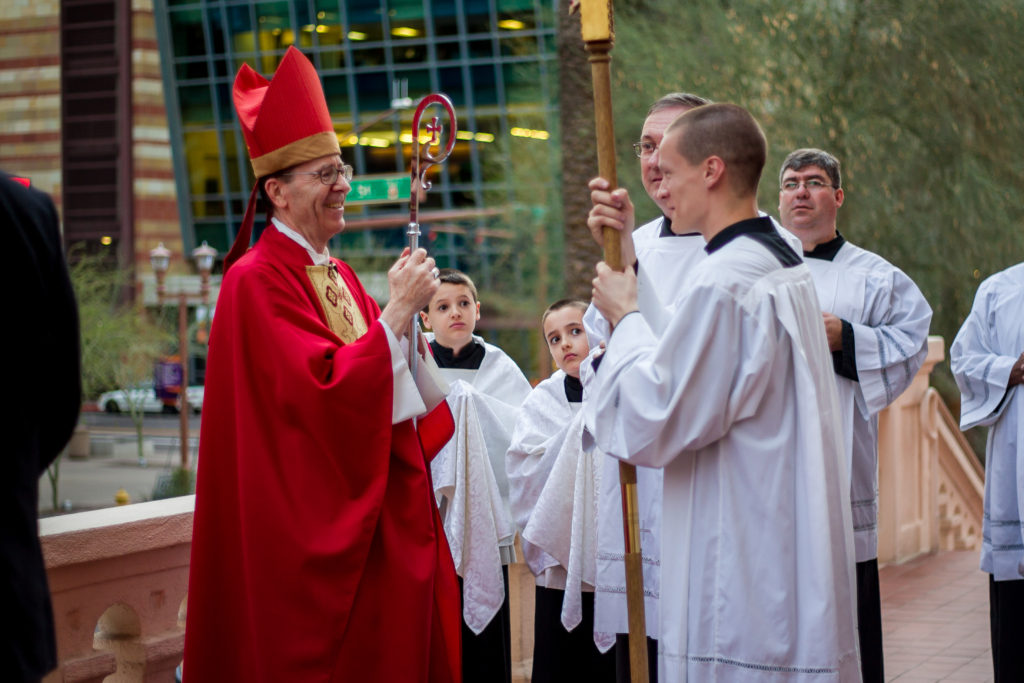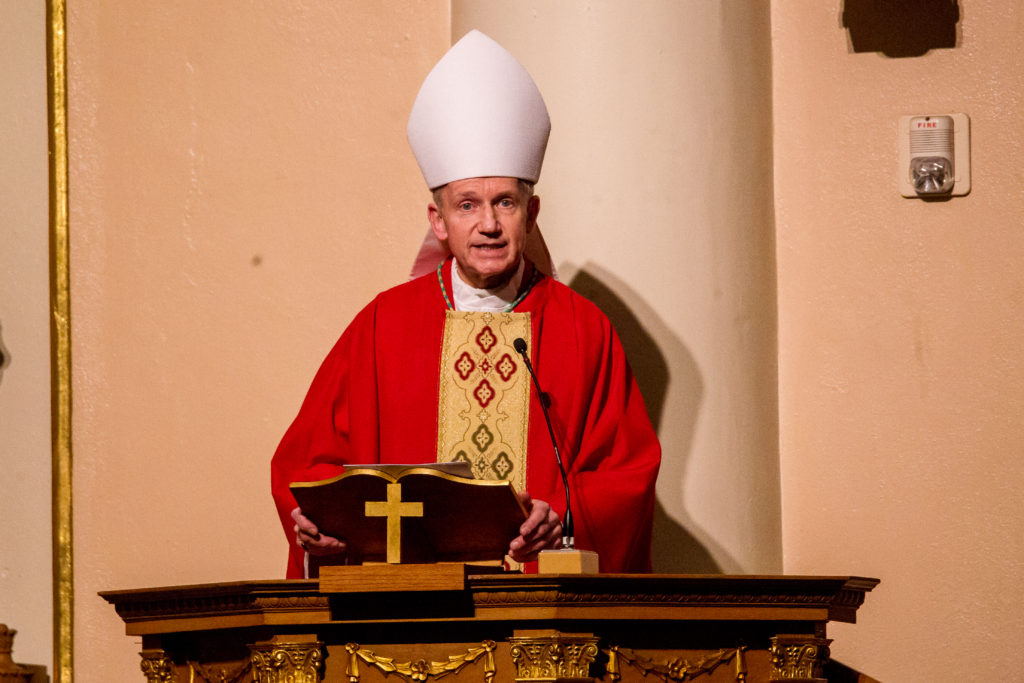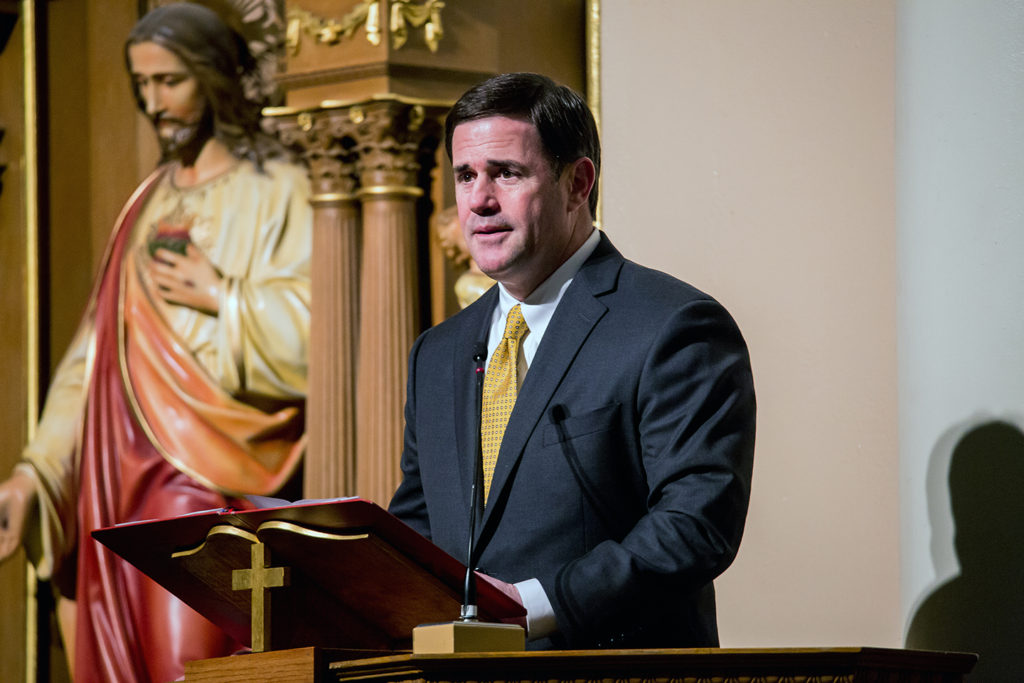

Lawmakers, lawyers and public officials who attended the Red Mass Jan. 20 were treated to a rousing homily as well as some lighthearted moments.
The annual gathering, which marks the opening of the legislative session, featured Bishop Thomas J. Paprocki of the Diocese of Springfield, Illinois. Affectionately known as the “Holy Goalie,” he noted that the Mass was taking place the same night as a game between the Phoenix Coyotes and the Chicago Blackhawks.
“If they weren’t playing in Chicago, we could have made this a double-header,” Bishop Paprocki quipped. The bishop, who became an attorney after being ordained a priest, is also an avid amateur hockey player.
In a homily peppered with rich details, Bishop Paprocki laid out the case for the defense of life and marriage as well as justice for the poor as inherently Catholic. It’s a “false dichotomy,” he said, that views serving the poor or being faithful to the teaching of the Church as being at odds with each other.
As for those who used the late Cardinal Bernardin’s “consistent ethic of life” views as a rationale to ignore Church teaching on the sanctity of life, Bishop Paprocki noted that “it is not sufficient to help the poor by feeding the hungry and providing pro bono legal services for the indigent, but then ignore the right to life from conception to natural death.”

Still, he said, “it is not sufficient to be pro-life and defend natural marriage as the lawful union of one man and one woman, but then ignore the corporal works of mercy by feeding the hungry and providing jobs for the unemployed.” The Church’s teachings, he said, cannot be classified as “liberal” or “conservative,” but rather provide universal principles that apply across the spectrum of life.
Bishop Paprocki also addressed the issue of the rights of conscience. In recent years, Catholic and other Christian denominations have come under fire for their refusal to redefine marriage.
[quote_box_center]
Text of Bishop Paprocki’s homily for annual Red Mass
[/quote_box_center]
In 2011, Catholic Charities in Illinois lost a $6 million contract with the state because its Catholic Charities adoption services refused to let children be adopted by same-sex or non-married, cohabitating couples.
Alan Tavassoli, board member of the St. Thomas More Society, the local group of Catholic attorneys that organizes the annual Red Mass, was struck by Bishop Paprocki’s courage to live out his convictions.
“Giving up a $6 million contract is not a drop in the bucket,” Tavassoli said. “That is a lot of money, but principles are more valuable in the end.”
Ron Johnson, executive director of the Arizona Catholic Conference, said he found Bishop Paprocki’s homily similarly inspiring.
“Bishop Paprocki did a great job reminding us what it is to be authentically Catholic and to live our faith all the way in all our lives, especially as an elected official, but for all of us,” Johnson said.

And while the high-profile homilist created a buzz, at least part of the excitement centered around some of those in attendance at the Mass. Newly elected Governor of Arizona Doug Ducey was on hand to deliver the first reading at the Mass. A fair number of legislators and judges participated in the Mass too.
Superior Court Judge Joseph Mikitish rarely misses a Red Mass and said he was touched by the homily.
“Whether it’s the hockey arena or in court, we’re all called to live out life fully, with the talents and passions God gives us,” Mikitish said.
Nicole Delaney, JCL, director of the tribunal for the Diocese of Phoenix, said she thinks Bishop Paprocki is one of the nation’s most courageous bishops.
“He’s not one that just says something and then hopes it happens. He actually takes action,” Delaney said.
Ryan Williams, who became an attorney three years ago, said he was moved by the oath of admission to the bar administered by Chief Justice Diane M. Johnson of the Arizona Court of Appeals. Each year, lawyers who attend the Red Mass renew their oath of admission to the bar.
“It was a reminder to all attorneys of the higher law that we are all called to practice,” Williams said, “That we’re called to justice, to peace and that we’re called to care for those who don’t have an advocate.”





